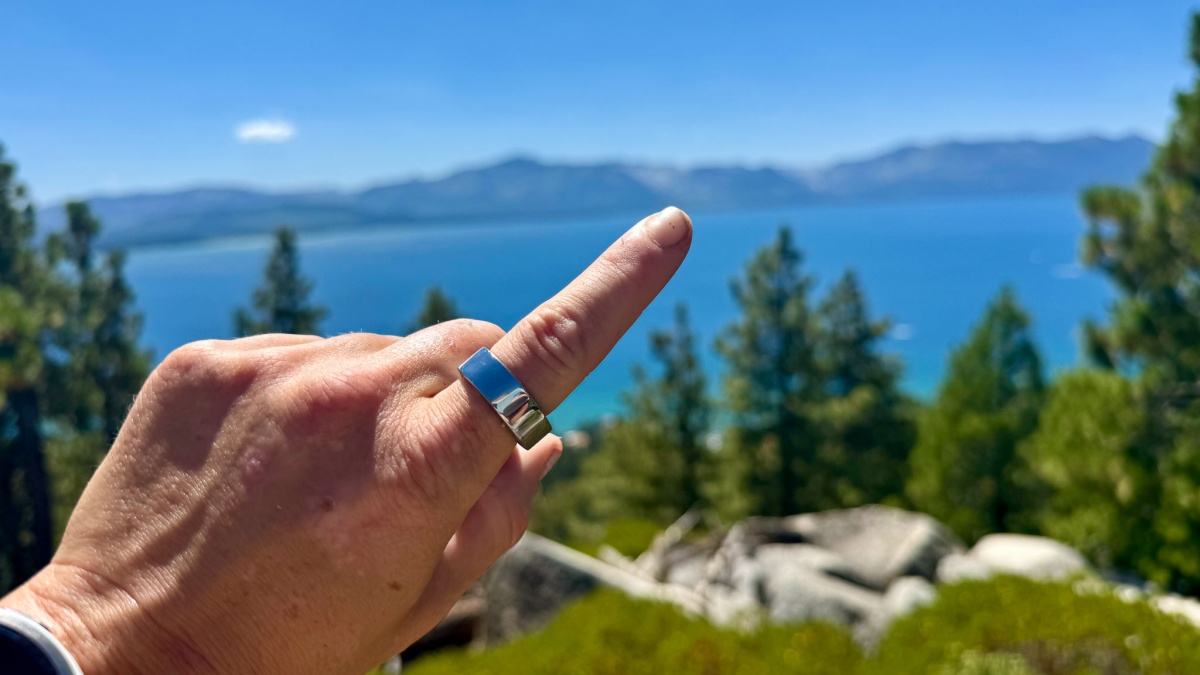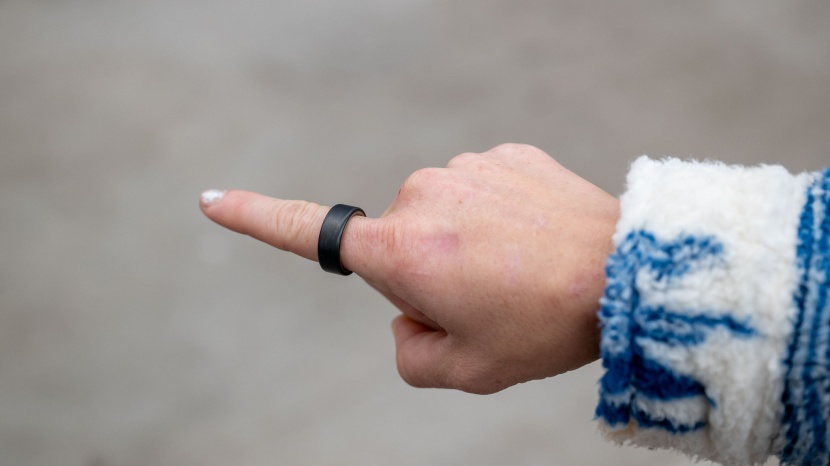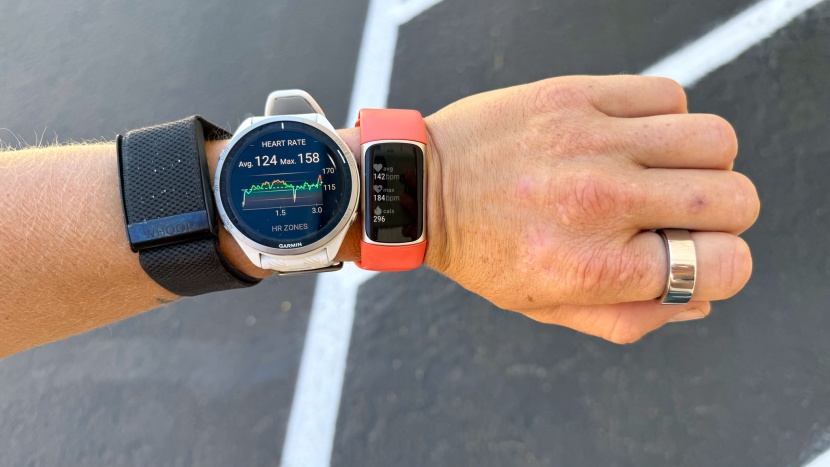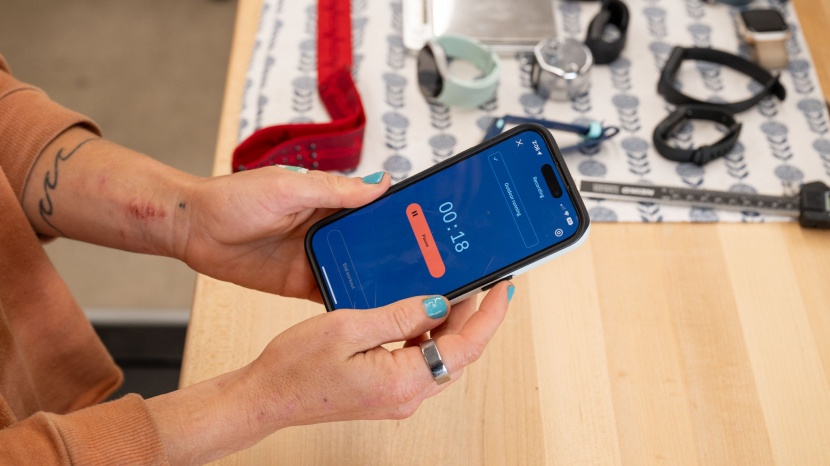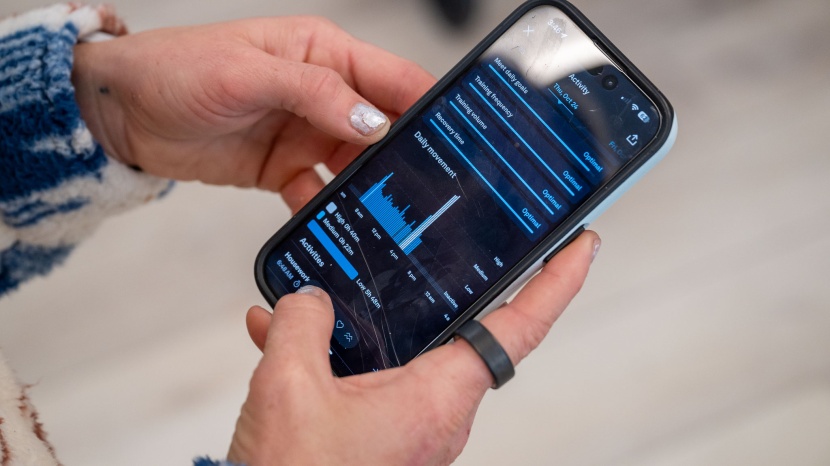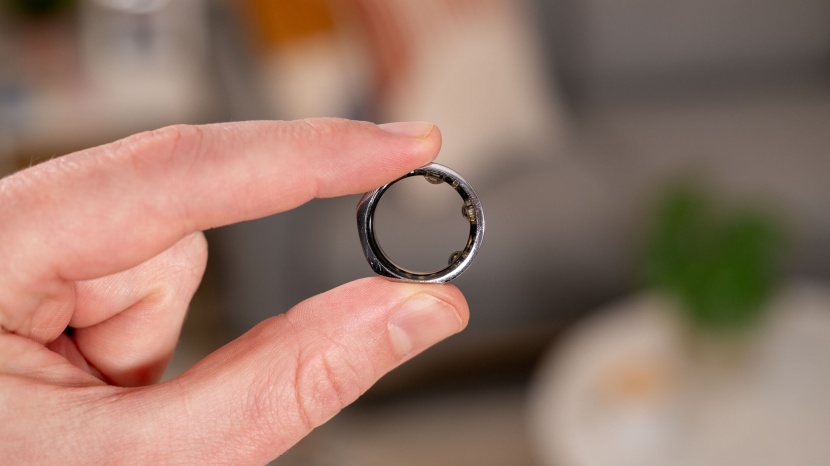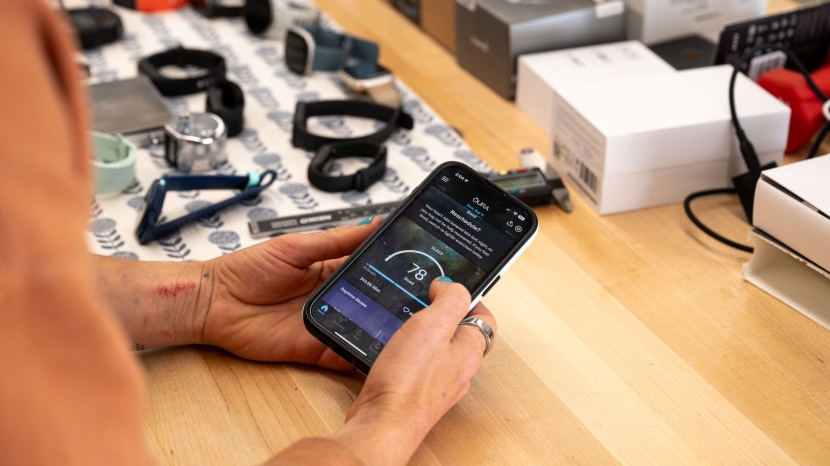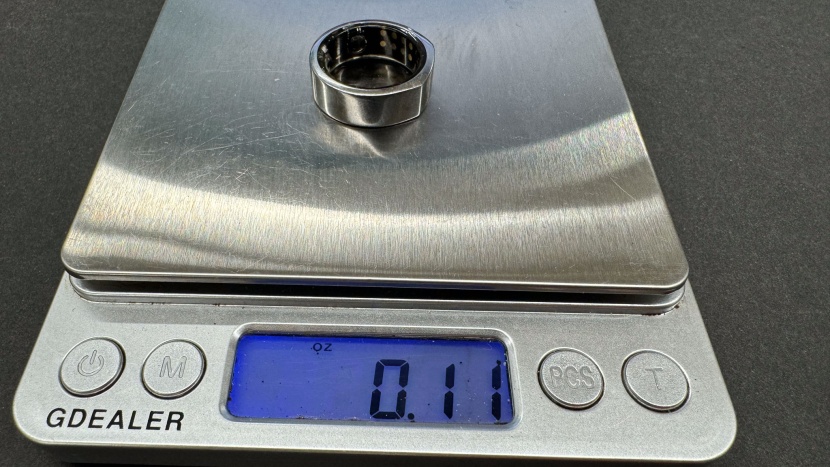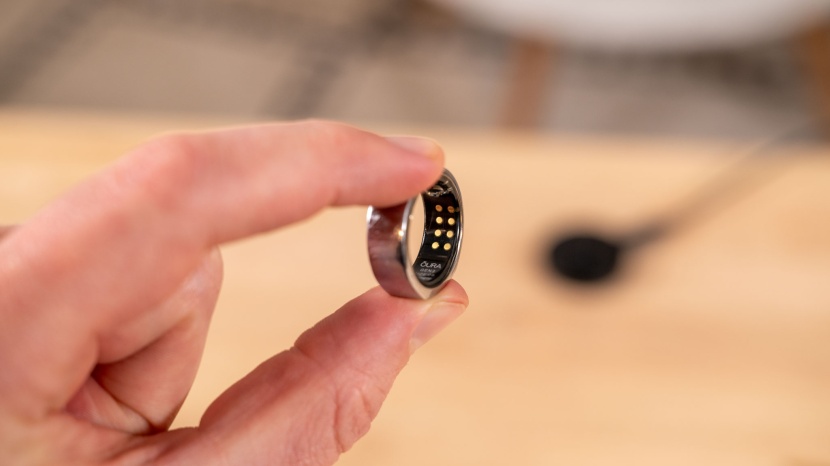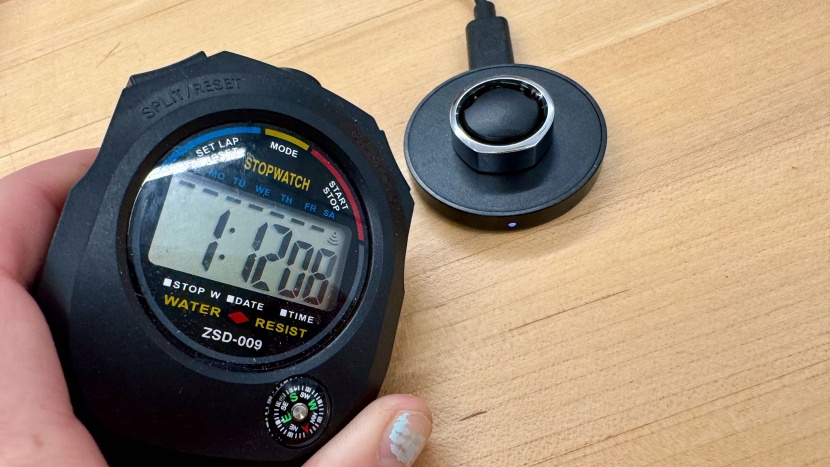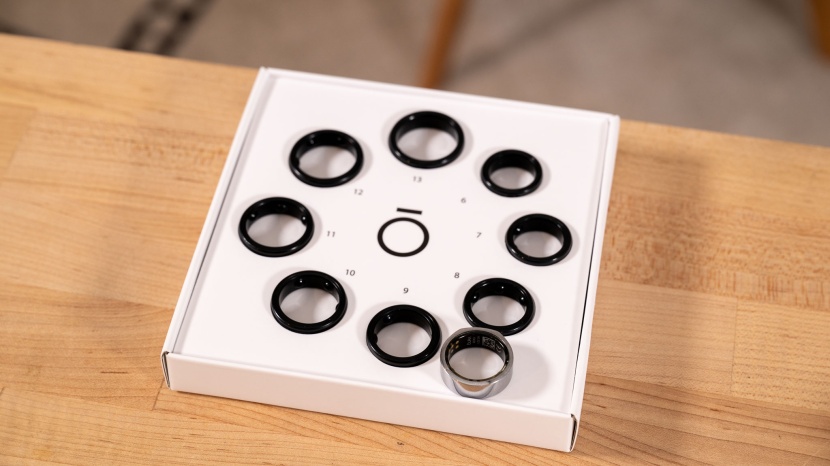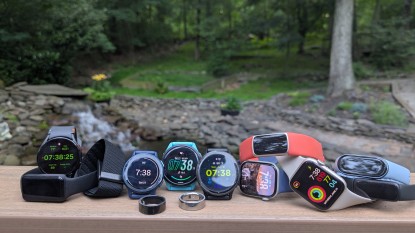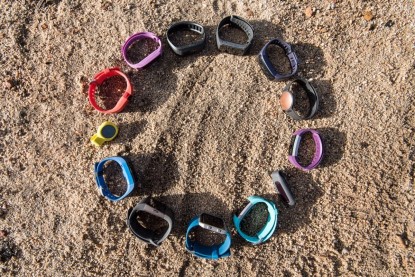
Our Verdict
Our Analysis and Test Results
Based in Finland, Oura has developed and produced smart rings since 2015. The Oura Ring 3 is an innovative device that tracks health and fitness via sensors embedded in the ring. The intention behind the Oura Ring is that the wearer keeps it on 24/7, removing it only to charge, which allows the ring to collect data on the wearer and transfer it to a tethered smartphone. Once uploaded, Oura then offers analysis, feedback, and suggestions based on the data, which can help the wearer identify how to improve health factors with exercise, sleep, and stress management.
Oura Ring 4
After spending a lot of time with the Oura Ring 3, we were really excited to try out the Oura Ring Gen 4, which was released after we had completed our testing of fitness trackers. We quickly bought one and were even more excited to bear witness to the huge number of improvements in the fourth generation, such as the shape of the ring (fully round and slimmer), no noticeable sensor “bumps” on the interior, increased responsiveness of activity detection, better battery life, faster charging, increased sensor accuracy, more durable finish, more heart rate data in the app (YES!), Oura Labs (experimental features such as meal tracking and Oura Advisor for personalized advice), and it is more comfortable!
We look forward to conducting more extensive testing of this fourth-generation model, but our impression is that Oura still needs to add some features to compete with dedicated fitness trackers. Nonetheless, the overall improvements in this model solidify it as an excellent lifestyle tracker.Fitness Impact
Although the Oura Ring is like a companion that is always ready for the next activity, it scored very low in fitness impact because it requires that you have your smartphone with you to collect location and speed data, and you can't monitor any data (like heart rate) during a workout.
GPS
The Oura Ring doesn't have a built-in GPS and requires a connected smartphone, with the app running in the background, to track distance and routes and to produce a map of a run, walk, hike, or cycling activity. The ring will store biometric data when you don't have your phone with you, but it can't record geolocation data.
Elevation
There isn't an altimeter in the Oura Ring for determining elevation change. Apps can get elevation data from a smartphone (which can be determined by geolocation), but the Oura app doesn't display this information. An Oura wearer would have to use a separate app, such as Strava, to determine elevation gain and/or loss.
Distance precision
Since the Oura Ring depends upon a smartphone to determine location, this sub-metric doesn't apply. Also, the Oura Ring does not provide any distance data for an indoor run on a treadmill.
Walking and step counting
For walking and step counting, the Oura Ring performs remarkably well. In our step trials, it was over 99.5% accurate. Impressive!
Cycling tracking
The Oura Ring tracks bike rides, but it is fairly limited in this area. During an activity, the only data viewable on a smartphone is duration. After the activity, we could view duration, calories burned, distance (with a map), intensity, and heart rate zone. We would like to see the app include average heart rate and maximum heart rate.
Workout tracking
After ten minutes of exertion, the Oura Ring autodetects an activity (note that this setting must be toggled first). We found it to work well when autodetecting a run or a walk, but if you happen to go for a jog/walk, it will split the activity into separate activities. We found this a little frustrating, but you can use a shortcut on the app screen to manually initiate a workout. When you are working out, you don't get any indication from the ring that it is tracking or see any data on your smartphone, like mileage, splits, or heart rate.
Trackable activities
When it comes to heart rate data, there are limited options for workout tracking. It really just comes down to indoor & outdoor running, indoor & outdoor cycling, and walking. You can add different activities (there are eighty-two in the menu), but there aren't other options for tracking heart rate. In this way, we found the workout tracking to be more like a journal than a tool for automatically recording biometrics during exercise.
Community
Oura provides a way to interact with friends or family via an “Oura Circle.”You can then adjust what data is shared within that group. We didn't find any way to participate in group challenges or to earn badges for achievements.
Health Impact
Health impact is where the Oura Ring shines, and we are impressed by the insight and depth of analysis that the app provides.
Heart rate
During our extensive testing with the Oura Ring, we found it to be reliably accurate at measuring heart rate, especially when compared to other fitness trackers in our lineup. The downside is that you can't view your heart rate during a workout. When we analyzed the data after our workouts and compared it with our Polar heart rate monitor, we found that the Oura Ring misses some rapid spikes or dips in heart rate (that occur during a HIIT workout). Still, it does a good job overall. We hope that Oura includes additional features in future updates that allow the wearer to access more heart rate data (such as max and average BPM) and see their heart rate in real-time.
Diet
When we first started testing the Oura Ring, diet tracking was not built into the app. It is possible to pair the app with a specific diet-tracking app, but we found that to be a little disappointing. While we were deep into testing, however, Oura released a beta for meal tracking that utilizes AI to analyze a photo of food and to create a log of what we ate. We found it worked well for recognizing ingredients, but it didn't provide calorie counts. Hopefully, that will be a feature in future updates!
Health indicators
The Oura Ring employs optical heart rate sensors, a skin temperature sensor, motion sensors (an accelerometer and gyroscope), infrared sensors (detect blood volume change and is used to estimate respiratory rate), and an ambient light sensor. Altogether, these provide the wearer with blood oxygen, heart rate variability, EKG, skin temperature, stress, VO2 max, fitness progress, and training load & recovery data. It also generates a Resilience score that is calculated from night-time recovery, daytime recovery, and daytime stress load. Invaluable insight and coaching can also be obtained from Trends and Explore tabs within the app. Our lead tester pointed out that a Rest Mode can be toggled when the wearer is sick or recovering, pausing activities, goals, and scoring--she wishes more fitness trackers included this thoughtful feature!
Sleep tracking
Sleep tracking with the Oura Ring is remarkably accurate and offers incredible insight. The ring detects naps and differentiates between resting in bed and sleeping. Most of all, however, it provides a ton of data and insight, such as REM sleep, deep sleep, time in bed, oxygen saturation, breathing regularity, etc.
We tested the Oura Ring for over a month, and during that time, it never missed logging sleep or stopped tracking. Of course, it is challenging to get objective sleep data (we were sleeping!). Still, the Oura data impressed us when we compared it with our actual sleep and waking times, our perceptions of sleep quality, and data from other sleep trackers.
Ease of Use
The Oura Ring scored below average in terms of ease of use, largely because it took a lengthy period of wearing the ring before it generated scores or summaries on our data.
Getting Started
As you might imagine, putting the Oura Ring on and downloading the app is straightforward (with the usual steps of creating a profile), but overall it takes two weeks to a month for some of the health scores, such as Resilience and Restorative Time.
Phone app
The way the app is set up suggests to us that the Oura Ring is oriented more toward general health monitoring and less as a fitness tracker. We found it to be well thought out and intuitive to use.
Wearability
Although it is designed to be worn on the index finger, our lead tester sometimes wore it on her ring finger, depending on swelling. Otherwise, it doesn't interfere with clothing, except occasionally when wearing very tight shirt sleeves.
Connectivity
The Oura Ring easily pairs with Apple and Android phones. We didn't have any issues with auto-uploading workouts, and it also paired easily with Strava. The app provides notifications, but the ring itself doesn't provide any notifications to the user.
Subscriptions
A three-month trial subscription comes with the purchase of the Oura Ring. After that, you are required to pay monthly or annually to access your data on the app.
Water resistance
Rated to 10 atmospheres (100m depth), the Oura Ring is well-suited to swimming, surfing, showering, and washing hands. No issues there!
Battery
We put the Oura Ring through its paces for over a month, and during that time, we observed that the battery life is good compared to other trackers in our lineup, but it also depends upon usage. Oura Ring states that the battery can last seven days, but it died on us during one of our three-day weekend tests. However, it had power to spare on another three-day weekend, so we aren't sure what the issue was (we wonder if temperature played a role).
Charging the ring was fairly straightforward, although we had to be sure the ring was lined up correctly. Early on, our lead tester learned that alignment on the charging stand is critical!
Fit
We had some issues with the fit of the Oura Ring, despite how light it is. In fact, our lead tester commented that she was “usually always aware that I am wearing it. It isn't a 'wear it and forget about it fit for me.” This shape (rounded but with one section with straight edges) felt a little clunky to her, and the domed sensors were quite noticeable.
It is possible to have a normal circle band, but that comes with an additional cost, as do other finishes. All that aside, Oura does provide a sizing kit for determining the correct size, and they recommend a trial period with a sample ring before committing.
Should You Buy the Oura Ring 3.0?
After wearing the Oura Ring for over a month and conducting a gamut of tests on it, we recommend it to someone who is interested in a wearable device and prioritizes health tracking information. Several people we know have used the Oura Ring to make positive changes in their health, particularly with sleep. It is an intriguing device, to be sure, and future versions and software updates will most likely result in ever greater function, but it isn't a good choice for someone training for an event or race who needs to monitor heart rate, pace, or distance in real time.
What Other Fitness Trackers Should You Consider?
If you are drawn to the Oura Ring because you want to track health data, we also recommend looking at the Whoop 4.0. The Oura Ring is smaller, but in our testing, we quickly got to the point where we didn't notice the Whoop at all. We never got to that point with the Oura Ring. Another minimal fitness tracker is the Fitbit Charge 6, which is also much less expensive than the Oura Ring, but it has a screen, and you can easily monitor fitness data while exercising.


